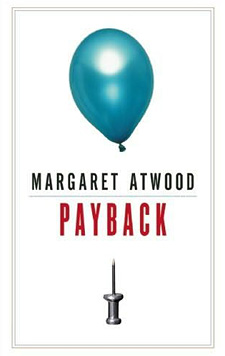 Margaret Atwood has won countless literary awards, including the Booker Prize, and is mostly famous for her fiction such as The Handmaid's Tale, The Blind Assassin and Oryx and Crake. However, her latest book is very different… in some ways. It is an extended essay on the origins and influence of debt. I say "in some ways" because there is a shadow side to all her novels. She often reveals the darkness within our human nature, and this book is no exception.
Margaret Atwood has won countless literary awards, including the Booker Prize, and is mostly famous for her fiction such as The Handmaid's Tale, The Blind Assassin and Oryx and Crake. However, her latest book is very different… in some ways. It is an extended essay on the origins and influence of debt. I say "in some ways" because there is a shadow side to all her novels. She often reveals the darkness within our human nature, and this book is no exception.
Payback is not about debt management, or the financial crisis, or managing your household budget. Nor is it about the excesses of debt: gambling, and mafia, or karmic justice. Instead it is an examination of the metaphor of debt in myth, religion and literature.
She begins by looking at the nexus between debt and sin. She describes debt as the "new fat", while before that fat was the new smoking which was the new alcoholism, which was the new whore-mongering… In the US apparently there are TV shows which look at how people get into terrible debt, then are helped to escape from debt. The Biggest Loser for shopaholics!
In fact there is a link between debt and sin; noticeable in traditional forms of the Lord's Prayer: "forgive us our debts, as we forgive our debtors". In Aramaic the same word is used for debt and sin. It is a recognition that we are in spiritual debt to God. Atwood quotes a sermon, where Reverend Olbrych likens God's act of forgiveness through Jesus to us finding that all our credit card debt and mortgages had been paid. Thus Jesus is our redeemer, he has paid the price in full.
Unfortunately, Atwood then goes on to quote a more Catholic than Biblical theology, that although the price has been paid, we keep adding to the debt, and we can never be quite sure the scales are balanced in our favour. Atwood has not captured the concept of grace.
Next, Atwood turns to examine debt as plot, looking at literature through the ages and the pervasive plot twist of debt. From The Taming of the Shrew to Pilgrim's Progress to David Copperfield... However, Atwood is especially focused on the character of Scrooge from Dickens' A Christmas Carol: a man ridiculously wealthy, yet preferring to keep others in his debt. She points out that debt is the plot of our everyday lives also: just think of the extent that a mortgage dominates our working lives.
The next chapter is on the shadow side, looking at the consequences of debt: fear, suffering and desire for revenge. She quotes Nelson Mandela who said that he had to forgive those who had imprisoned him by the time he reached the prison gates or he would be bound by the chains of vengeance forever. Particularly poignant is a speech she imagines, delivered by the President of the United States in response to 9/11 where he says that it is much better to forgive those who have done this terrible thing rather than to enter a cycle of vengeance by bombing the stuffing out of the civilian population of the country where the terrorists were alleged to originate.
Her final chapter is on payback. She points out that if we only analyse our debt in financial terms then we are underestimating it. In fact every action has a social and environmental cost which we tend to overlook until disaster is upon us. She believes it is healthier to see ourselves as born into debt, and to spend our lives looking for creative ways of paying back, whether it be forgiveness, or acts of service, or caring for our environment… That attitude has spiritual consequences also.



























